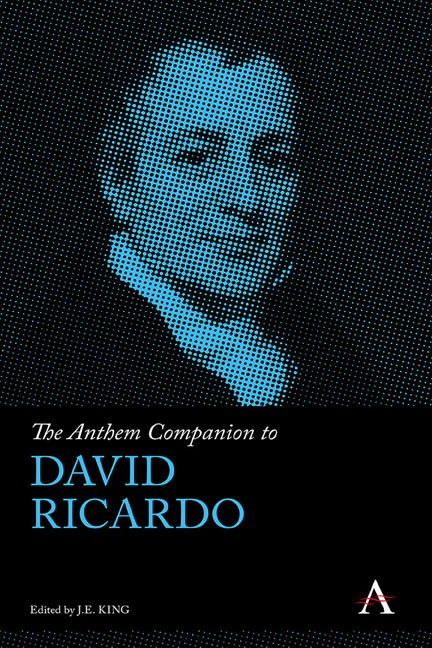Book contents
- Frontmatter
- Contents
- Notes on Contributors
- Chapter 1 Introduction
- Chapter 2 On Some Myths about Ricardo’s Theory of Money
- Chapter 3 Ricardo on Foreign Trade
- Chapter 4 ‘A Tolerably Correct Law Respecting Proportions’: Ricardo on Income Distribution
- Chapter 5 Ricardo on Economic Policy
- Chapter 6 (Mis)Interpreting Ricardo
- Chapter 7 Ricardo’s Business Activities
- Chapter 8 Political Economy ‘Through a Glass Hive’? The Encounter of Ricardian Ideas with Nineteenth-Century Australia
- Chapter 9 Ricardo and Classical Political Economy
- Chapter 10 Ricardo and Marx
- Chapter 11 Malthus and Ricardo on the Dismal Science
- Further Reading
- Index
Chapter 5 - Ricardo on Economic Policy
Published online by Cambridge University Press: 17 October 2023
- Frontmatter
- Contents
- Notes on Contributors
- Chapter 1 Introduction
- Chapter 2 On Some Myths about Ricardo’s Theory of Money
- Chapter 3 Ricardo on Foreign Trade
- Chapter 4 ‘A Tolerably Correct Law Respecting Proportions’: Ricardo on Income Distribution
- Chapter 5 Ricardo on Economic Policy
- Chapter 6 (Mis)Interpreting Ricardo
- Chapter 7 Ricardo’s Business Activities
- Chapter 8 Political Economy ‘Through a Glass Hive’? The Encounter of Ricardian Ideas with Nineteenth-Century Australia
- Chapter 9 Ricardo and Classical Political Economy
- Chapter 10 Ricardo and Marx
- Chapter 11 Malthus and Ricardo on the Dismal Science
- Further Reading
- Index
Summary
There is absolutely no doubt that David Ricardo was one of political economy's greatest theorists. Nicholas Kaldor suggested many years ago that his Principles of Political Economy and Taxation should be rated as one of the discipline's five great texts, preceded by Adam Smith's Wealth of Nations and followed by Karl Marx's Capital, Alfred Marshall's Principles of Economics and John Maynard Keynes's General Theory (Kaldor 1982: 259). But, like these four authors, Ricardo was no armchair theorist. His interest in political economy was first aroused by his concern with the important policy question of the causes of the high price of bullion, which led in 1809–11 to his first publications, and in the Principles he devotes 15 of its 32 chapters to policy issues. To explain both Ricardo's concern with questions of economic policy and the positions that he took on these matters, I begin this chapter by describing the society that he lived in and his understanding of the problems that were posed by the nature of its economic and political systems. I then outline Ricardo's own political beliefs, before examining his position on four crucial issues: monetary policy, fiscal policy, social welfare and international trade. I conclude the chapter with something related yet very different, the views of the so-called Ricardian Socialists, who accepted the truth of the labour theory of value but took a very different position from that of Ricardo on many of these questions.
Ricardo's England
Ricardo's England had three essential characteristics. First, it was a very complex society, which had changed very substantially since the ending of feudalism several centuries earlier. Second, it was continuing to change very rapidly. Third, and despite these two important features, it contained a very simple core that formed the basis of Ricardo's policy prescriptions: there were three social classes, landlords, capitalists and workers, who faced very different circumstances and so behaved in very different ways (King 2013: chapter 1).
According to the 1771 census, the England into which Ricardo was born in the following year had 6.6 million people. Half a century later, two years before his death in 1823, it had increased to 11.5 million. By the 1820s the English population was growing at 1.5 per cent per annum, faster than ever before and unparalleled anywhere in the world.
- Type
- Chapter
- Information
- The Anthem Companion to David Ricardo , pp. 73 - 90Publisher: Anthem PressPrint publication year: 2023



